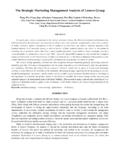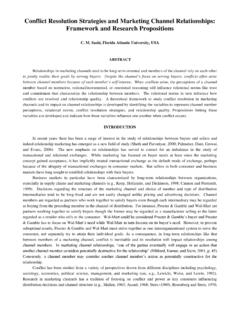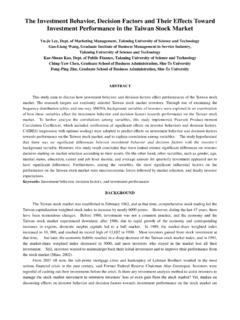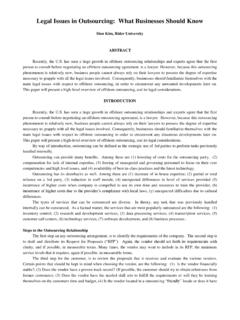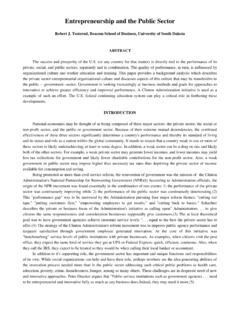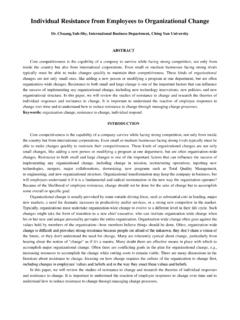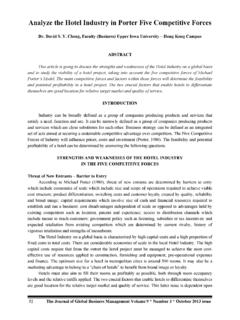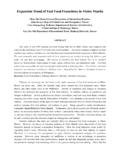Transcription of Accrual Based Earnings Management, Expectations …
1 Accrual Based Earnings management , Real Transactions Manipulation and Expectations management : and International Evidence Dr. sherry Fang Li, Rider University, Dr. Evelyn McDowell, Rider University, Dr. Erin A. Moore, Westfield State College, ABSTRACT Managers face a number of incentives to report Earnings that meet or exceed the consensus analyst forecast. If a firm s results of operations are not sufficient to meet the analysts Expectations for a given period, the manager may 1) use Accrual Based Earnings management techniques or 2) structure actual transactions to achieve the desired financial reporting result. Additionally, the manager may attempt to guide the analyst s forecast down to a beatable level, a phenomenon referred to as Expectations management .
2 This paper provides an overview of these three mechanisms and describes the interrelationships among them. Recent changes in the regulatory environment in the United States ( , Regulation Fair Disclosure and the Sarbanes Oxley Act) have changed managers use of these tools. This paper discusses these changes as well. Evidence of the existence of these practices in both the United States and in various countries throughout the world is discussed. Keywords: Accrual Based Earnings management , real transactions manipulation, Expectations management INTRODUCTION It is well known that managers use Accrual Based Earnings management techniques to provide flexibility within the accounting rules to report an Earnings number that meets or beats the consensus analyst forecast.
3 The market rewards firms that meet or exceed Earnings Expectations , and penalizes firms whose Earnings fall short. In the years following the passage of the Sarbanes-Oxley Act of 2002, research shows that Accrual Based Earnings management appears to be decreasing. Managers presumably perceive the risks and costs of detection to be higher than the benefits of managing Earnings in a heightened regulatory environment. However, Accrual Based Earnings management techniques are not the only tools available to managers to help them meet analysts forecasts. If a firm s results of operations will not be sufficient to meet the analyst forecast for a given period, managers may also 1) structure actual transactions to achieve the desired accounting result, a phenomenon often referred to as real transactions manipulation or real transactions Based Earnings management , or 2) attempt to guide the analyst forecast down to a beatable level, a phenomenon referred to as Expectations management .
4 The purpose of this paper is to provide a summary of the key issues related to firms propensities and incentives to meet analysts Earnings Expectations and the tools that managers can use to make the number. This paper will provide an overview of Accrual Based Earnings management , real transactions Based Earnings management and Expectations management , and highlight the interrelationships between these three phenomena. Additionally, the article will discuss how public policies such as Regulation FD and the Sarbanes-Oxley Act affect managers use of each of these tools. The discussion will provide examples of relevant research findings on these topics from both a and international perspective.
5 MANAGERS INCENTIVES TO MEET Earnings Expectations Managers have a number of incentives to report Earnings that meet or exceed analysts Earnings forecasts. Given that the market views the act of meeting or beating Earnings forecasts as a signal of future profitability, investors reward firms that meet or exceed analysts Expectations . According to Bartov et al. (2002), firms that meet or exceed the forecast enjoy a higher stock return than firms that fall short of Expectations . Additionally, investors penalize firms for reporting Earnings below Expectations . Skinner and Sloan (2001) document an asymmetric market response for missing the analyst forecast. Specifically, the market penalty for falling short of Expectations by one cent is larger than the market reward for exceeding Expectations by one cent.
6 In addition to the capital market considerations, managers have incentives to meet or exceed analysts Expectations to 1) enhance their own reputations in the managerial labor market and 2) to enhance their firm s reputation with external stakeholder groups such as suppliers, customers, and creditors, in order to earn better terms of trade. In a survey of financial executives, Graham et al. (2005) find that approximately 75% of respondents agree that a manager s concern with his or her own reputation is a motivation to meet the Earnings target. The same survey documents that approximately 60% of respondents agree that maintaining the firm s reputation with stakeholders is a motivation to meet Earnings targets.
7 The survey went on to report that 80% of respondents believe that failing to meet Earnings targets introduces uncertainty in the market with respect to the firm s future prospects, and 60% of respondents reported that missing an Earnings target introduces a concern that the firm may be having problems. Standard setters and accounting regulators have expressed a great deal of concern over managers obsessions with meeting short-term Earnings Expectations . In 2000, then SEC Chairman Arthur Levitt stated ..corporate America's motivation to meet Wall Street Earnings Expectations could be overriding common sense business practices. The zeal to project smoother Earnings from year to year cast a pall over the quality of the underlying numbers.
8 THE USE OF ACCRUALS Based Earnings management TECHNIQUES TO MEET Earnings Expectations Earnings management can be defined as the selection of accounting policies to achieve a desired financial reporting result. Using Accrual Based Earnings management techniques to meet analysts forecasts in the United States has been well documented in the literature (see for example Matsumoto 2002, Phillips et al. 2003, and Krull 2004). Accruals are the difference between net income and cash flows. For example, when companies sell items to others on credit during a growth period, the sale creates an Accrual of revenue. When companies engage in Earnings management , they can increase or decrease income by creating accruals; these are often referred to as non-discretionary accruals.
9 However, it is the discretionary accruals, accruals created to manipulate changes in reported Earnings , that are of concern. These types of accruals include using increasing or decreasing estimates of bad debt reserves, warranty costs, and inventory write-downs. Prior to the passage of the Sarbanes Oxley Act, research found extensive evidence of Accrual Based Earnings management . For example, Robb (1998) shows that bank managers make greater use of the loan loss provision to manipulate Earnings upward when analysts have reached a consensus in their Earnings predictions. Payne and Robb (2000) find that firms with pre-managed Earnings below analysts Earnings Expectations have greater positive abnormal, or discretionary accruals.
10 Moehrle (2002) reports that firms use restructuring Accrual reversals to manage Earnings to beat analysts' forecasts. Kaznik and McNichols (2002) and Bartov (2002) also provide evidence consistent with accruals manipulation to meet or beat analysts estimates. The Sarbanes Oxley Act, passed in 2002 in response to the accounting scandals involving Enron, WorldCom, Arthur Andersen, and others, is considered to be one of the most significant pieces of securities legislation since the Securities Acts of 1933 and The Act contains a number of provisions aimed at reducing the instances of financial accounting fraud that plagued the late 1990s and early 2000s ( , Tyco, HealthSouth, Enron, WorldCom, Global Crossing).
